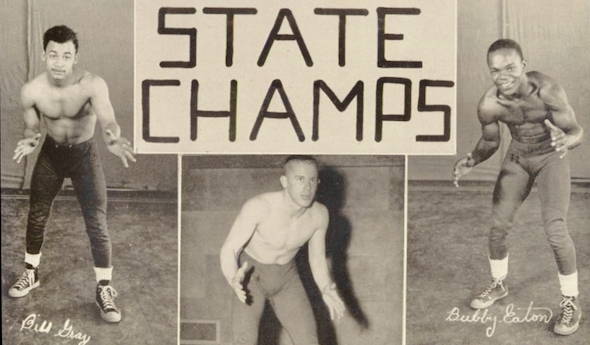
Old 5-A League Fueled Wrestling's Rise
June 29, 2020
By Ron Pesch
Special for Second Half
This latest quest into wrestling began with an inquiry, as these projects often do.
My work with the MHSAA – which includes the title ‘historian’ – is mostly a hobby that began many years ago. The diversion often gets me into press boxes and places the average sports fan doesn’t usually get to venture. Now and then, I get to talk into a microphone. But mostly, it is hours of digging; pouring through scrapbooks, yearbooks and newspapers, old and new, as I search for names, details and stories lost in time. The pursuit sometimes leads to awkward phone calls, e-mails and messages where I try to describe who I am and why I’m chasing a phone number for someone, a person’s mother or father, grandmother or grandfather.
I adore the chase and resolving mysteries. I love visiting libraries and schools and delight in connecting with people. I love filling in holes and connecting dots. I’m a computer guy by trade, focused on analyzing and aligning data. I equate sports searches to detective work, and for fans of old television, I’m like Columbo without the trench coat or cigar, always asking, “Just one more thing …”
Wrestling
My first visit to the sport was in junior high gym class. That’s when Coach Murphy paired me up against another undersized classmate. With the shrill of a whistle, we battled it out on a deep red colored mat – representative of one half of the red and grey school colors of Nelson Junior High. The struggle lasted for no more than a matter of seconds. With a slap of a mat, or perhaps another whistle, it was over. I lost by ‘fall’ – the gentler way of saying I was pinned.
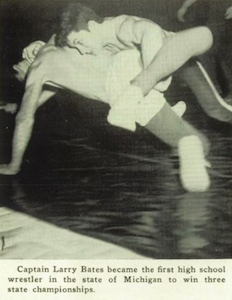 My second visit to the sport came in high school. That’s when the wrestling coach stopped me in the hall one day to suggest I join the wrestling team. Apparently, word of the skills I demonstrated at Nelson hadn’t travelled the half mile east from the junior high to the high school. Quickly recognizing this fact, I told him it might be counter-productive, as I wasn’t much of a wrestler. He was undeterred. Because I was still undersized, he said, I would likely win a fair number of matches. Many schools, it seemed, struggled to find someone to wrestle in the lower classes, and hence, would have to forfeit. I still turned him down.
My second visit to the sport came in high school. That’s when the wrestling coach stopped me in the hall one day to suggest I join the wrestling team. Apparently, word of the skills I demonstrated at Nelson hadn’t travelled the half mile east from the junior high to the high school. Quickly recognizing this fact, I told him it might be counter-productive, as I wasn’t much of a wrestler. He was undeterred. Because I was still undersized, he said, I would likely win a fair number of matches. Many schools, it seemed, struggled to find someone to wrestle in the lower classes, and hence, would have to forfeit. I still turned him down.
I give credit to the Coach Erickson. He was trying to involve a kid in athletics that wasn’t going to make the football, basketball or track team. But that bit of wisdom didn’t hit me until long after high school.
As the above may demonstrate, an extensive understanding of the intricate particulars of wrestling isn’t my strong suit. I’ve attended only one MHSAA Wrestling Final. That visit still remains among my favorite sports sights. The pageantry of the Grand March staged before the orchestrated pandemonium of the MHSAA wrestling championship combined with huge crowds and inspiring athleticism creates a spectacular event.
The Latest Project
Recently, a question, relating to past individual champions from the earliest days of the championships, arrived at the MHSAA office. The Association has awarded wrestling titles since 1948, and a list of team champions and runners-up from the beginning to the present appear on the MHSAA Website. Missing, however, are the names of the individuals who won championships between 1948 and 1960.
To find an answer, that meant a deep dive into newspapers, yearbooks and old wrestling guides to exhume the particulars from articles and agate, cross-referencing results, matching last names to first names, correcting spellings and occasionally schools when obvious errors have been made.
Technology has helped carve away some time and travel when embarking on such a project. Once, the only way to dig out such information was to travel to microfilm, and then spend hours scrolling past print. Today, thanks to some online archives, even during a global pandemic, we can visit a handful of Michigan newspapers via the internet. Tack on the ability to search the online cloud of information, intriguing elements intermittently bubble to the surface, transforming a standing list of names and schools to an account that brings at least some names to life.
The Beginnings
An initial look at the existing team championship listings revealed the first fact. For all intents and purposes, the earliest days of the MHSAA wrestling state championships served as a glorified meet for the members of the 5-A Conference. The league, comprised of Ann Arbor, Battle Creek Central, Jackson, Lansing Eastern and Lansing Sexton high schools, was where wrestling as a prep sport first gained traction in Michigan. Almost immediately, Greater Lansing established a stronghold on the sport that would last those first 13 years.
From 1948 to 1960, there was only one classification in which all schools, regardless of size, competed. In 10 of those 13 years, one of two Lansing high schools – Eastern or Sexton – won the state’s mat championship. In the three years when a Lansing team didn’t win, they finished as runner-up. Those three were part seven total of that baker’s dozen when either Eastern or Sexton finished second.
Growth in Michigan
The first championship tournament in 1948 involved around a dozen schools. While expansion into other schools commenced slowly, by 1957, wrestling had progressed into the fastest growing sport in Michigan.
“The sport blossoms into many new schools every year,” stated George Maskin in a January issue of the Detroit Times in 1957. “Best estimates are that at least 60 varsity prep teams now are in competition. The figure should come close to the 100 mark within a year or two. Prep wrestling has grown with such swiftness it now is necessary to hold regionals to determine qualifiers for the state meet.
“It is not the kind of wrestling one has watched on television or in some of the professional arenas around the state,” he added, trying to educate the public about the difference between the prep sport and the form of broadcast entertainment then popular. “Groans and grunts have no part in high school wrestling … nor does hair pulling or stamping the feet … or pointing a finger into the referee’s eye.”
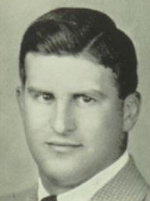 Coaches of wrestling noted that it was one of the few sports offered that gave equal opportunity to students regardless of their physical build. Separated into 12 weight classifications, running from 95 pounds and under up to the unlimited, or heavyweight division, there was a place for all.
Coaches of wrestling noted that it was one of the few sports offered that gave equal opportunity to students regardless of their physical build. Separated into 12 weight classifications, running from 95 pounds and under up to the unlimited, or heavyweight division, there was a place for all.
“Take the kid who weighs 95 pounds,” Ignatius ‘Iggy’ Konrad, a former wrestler at Michigan State and the coach at Lansing Sexton, told Maskin. “He’ll participate against a boy of similar weight. Thus a kid whose athletic possibilities might appear hopeless (in other sports) finds a place for himself in wrestling.”
As the sport continued to expand, coaches were still trying to explain the worth.
“Parents should try to understand the difference between television wrestling and high school and college wrestling,” Grandville coach Kay Hutsell told a Grand Rapids Press reporter in December 1960. “There is no comparison. TV is 100 percent acting.”
A state champion wrestler as a high school student in Illinois, where spectator interest and participation was far greater than in those early days of wrestling in Michigan, Hutsell twice lettered in the sport at Indiana University.
“Wrestling is a conditioner and perhaps develops the body better than any other sport. About the only way wrestling can educate the adults (in the western Michigan area about the sport) is through newspapers.” He felt people should come to “see for themselves.”
The Tournament
Lansing Sexton won the state’s inaugural team wrestling title, 54-43 over the Ann Arbor Pioneers, with the event run off on the mats of the University of Michigan in 1948. Both Floyd Eaton at 127 pounds and Carl Covert at 133 ended the year undefeated for the Big Reds. Five wrestlers from each school earned individual titles that first year. Jackson’s heavyweight, Norm Blank, scored a pin over Sexton’s Dick Buckmaster. The pair had split their two previous matches during league competition.
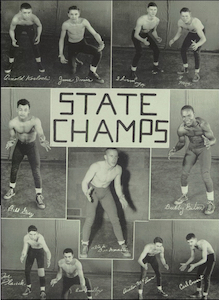 Ann Arbor grabbed the next two MHSAA team titles, both by a mere four points, first 60-56 over Sexton, then topping the Quakers of Lansing Eastern, 56-52, in 1950.
Ann Arbor grabbed the next two MHSAA team titles, both by a mere four points, first 60-56 over Sexton, then topping the Quakers of Lansing Eastern, 56-52, in 1950.
Eight wrestlers qualified for the final round for both Ann Arbor and Sexton in 1949, with five each earning championships. Both schools had three wrestlers finish in third and fourth place; hence the team title was awarded based on Ann Arbor tallying more pins. A total of 96 wrestlers from 11 schools participated in the tournament. Ted Lennox, wrestling at 95 pounds, became the first athlete from the Michigan School for the Blind to compete for an individual title but was defeated by Sexton’s Leo Kosloski. Lennox would later wrestle for Michigan State.
In 1950, nine Ann Arbor wrestlers advanced to the final round with six seizing championship medals, but only Sam Holloway repeated as champion from the previous year. Teammate Jack Townsley, who had won in 1949 at 112 pounds, finished second at 120.
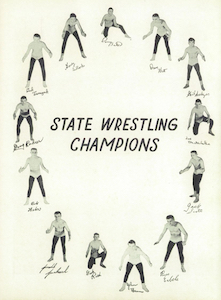 Eastern and coach Don Johnson grabbed the first of two consecutive titles in 1951, topping Ann Arbor, 56-52, with East Lansing finishing a distant third with 26 points. Pete Christ of Battle Creek Central became the first Bearcat (and only the second athlete from a school other than Eastern, Sexton or Ann Arbor) to bring home an individual wrestling title, with a decision over Lansing Eastern’s Vince Malcongi in the 140 classification. “The Bearcat matmen took fourth in the State,” according to the Battle Creek yearbook. “Mr. Donald Cooper took over the coaching duties when Mr. Allen Bush was called to the Marines.” (Bush would later serve as executive director of the MHSAA).
Eastern and coach Don Johnson grabbed the first of two consecutive titles in 1951, topping Ann Arbor, 56-52, with East Lansing finishing a distant third with 26 points. Pete Christ of Battle Creek Central became the first Bearcat (and only the second athlete from a school other than Eastern, Sexton or Ann Arbor) to bring home an individual wrestling title, with a decision over Lansing Eastern’s Vince Malcongi in the 140 classification. “The Bearcat matmen took fourth in the State,” according to the Battle Creek yearbook. “Mr. Donald Cooper took over the coaching duties when Mr. Allen Bush was called to the Marines.” (Bush would later serve as executive director of the MHSAA).
Johnson’s squad absolutely dominated the field in 1952, topping Sexton the next year, 68-43. Ann Arbor followed with 39 points. Seven Quakers – George Smith (95), Herb Austin (103), Jim Sinadinos (127) Bob Ovenhouse (133), Bob Ballard (138), Ed Cary (145) and Norm Thomas (175) – all won their final matches. Both Austin and Sinadinos were repeat champions.
Sexton flipped the table in 1953 with a 67-46 win over Eastern. Ten Big Reds competed for individual state championships among the 12 classifications, with five taking home titles. The Big Reds’ Ken Maidlow, jumping from 165 pounds to 175, and Eastern’s Ed Cary, who moved up to 154, both repeated as medal winners. In the heavyweight class, Sexton’s Ray Reglin downed Steve Zervas from Hazel Park. (Zervas, a two-time runner-up, later wrestled at the University of Michigan, then coached wrestling at Warren Fitzgerald for 34 seasons and served as mayor of Hazel Park from 1974 to 1986).
In 1954, Ossie Elliott of Ypsilanti and Henry Henson of Berkley became the first wrestlers from non 5-A schools to win individual state wrestling titles. Elliott, who had finished as state runner-up in 1953 at 133 pounds, downed Lansing Sexton’s Tom Holden in the same classification. Henson earned a decision over Lansing Eastern’s Ken Bliesener at 154 pounds. Eastern again returned to the winner’s circle, outdistancing Sexton, 60-44. Ypsilanti finished third with 34 points.
By 1955, athletes from 28 high school teams were battling for state team and individual honors on the mats at MSC’s Jenison Field House. As a senior captain, Lansing Eastern’s Larry Bates pinned four out of five opponents in the 112-pound class to become Michigan’s first wrestler to earn three state crowns. Bates grabbed his first title in 1953, competing at 95 pounds, followed by his second in 1954 at 103. Eastern picked up its second-straight team trophy, racking up 102 points on the way to a fourth crown in the eighth year of championships. For the first time, a non-5-A school finished second, as the Ypsilanti Braves grabbed runner-up honors with 84 points.
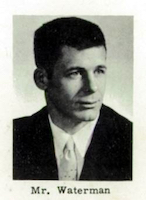 Coach Bert Waterman led Ypsilanti to the first of four championships during a 10-year span in 1956. Two Braves, Ambi Wilbanks and Walt Pipps, earned titles while three others finished second in their classifications. Ypsi had lost one dual meet during the regular season, to Lansing Eastern, by a slim three-point margin. With the 1967-68 school year, Waterman would embark on a 24-year career as coach at Yale University after posting a 192-35-4 mark in 16 seasons at Ypsilanti. A 1950 graduate of Michigan State, the former Spartans wrestler would join Eastern’s Don Johnson, Sexton’s Iggy Konrad, Fran Hetherington from the School for the Blind and two other high school coaches as a charter member of the Michigan Wrestling Hall of Fame in November 1978.
Coach Bert Waterman led Ypsilanti to the first of four championships during a 10-year span in 1956. Two Braves, Ambi Wilbanks and Walt Pipps, earned titles while three others finished second in their classifications. Ypsi had lost one dual meet during the regular season, to Lansing Eastern, by a slim three-point margin. With the 1967-68 school year, Waterman would embark on a 24-year career as coach at Yale University after posting a 192-35-4 mark in 16 seasons at Ypsilanti. A 1950 graduate of Michigan State, the former Spartans wrestler would join Eastern’s Don Johnson, Sexton’s Iggy Konrad, Fran Hetherington from the School for the Blind and two other high school coaches as a charter member of the Michigan Wrestling Hall of Fame in November 1978.
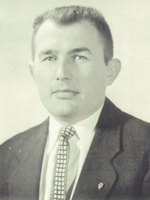 Runner-up in 1956, Eastern grabbed another title in 1957 topping Battle Creek Central, 93-89, in the tournament standings. It was a surprise “going away present” for Coach Don Johnson, who was stepping away after 10 seasons of coaching the Quakers to accept the assistant principal position at Eastern. Battle Creek had five wrestlers advance, and held a 56-48 lead over Eastern as the teams entered the final round. The Quakers’ Ted Hartman opened the day with a victory in the 98-pound weight class, helping Eastern post a 3-1 record in championship round matches. Sexton assisted with the Eastern victory when Norm Young defeated Battle Creek’s Bob McClenney in the 120 weight class. The Bearcats, who had five wrestlers in the finals, ended with two individual champs on the day and their highest finish in their 10 seasons of wrestling.
Runner-up in 1956, Eastern grabbed another title in 1957 topping Battle Creek Central, 93-89, in the tournament standings. It was a surprise “going away present” for Coach Don Johnson, who was stepping away after 10 seasons of coaching the Quakers to accept the assistant principal position at Eastern. Battle Creek had five wrestlers advance, and held a 56-48 lead over Eastern as the teams entered the final round. The Quakers’ Ted Hartman opened the day with a victory in the 98-pound weight class, helping Eastern post a 3-1 record in championship round matches. Sexton assisted with the Eastern victory when Norm Young defeated Battle Creek’s Bob McClenney in the 120 weight class. The Bearcats, who had five wrestlers in the finals, ended with two individual champs on the day and their highest finish in their 10 seasons of wrestling.
An All-American wrestler at Michigan State, Johnson would remain at Eastern throughout his education career, retiring as principal in 1983. The fieldhouse at Eastern was named after him in December 1984, fittingly just prior to the championship round of the annual Eastern High Wrestling Invitational.
Eastern again went back-to-back, topping Sexton, 88-57, with Ypsilanti third in the 1958 championship standings. The meet, culminating with 16 boys competing in each weight division – four each from regionals hosted at Battle Creek, Lansing, Ypsilanti and Berkley – was held at the Intramural Building at the University of Michigan. Both Eastern and Sexton advanced four wrestlers to the final round, with Eastern’s Gary Gogarn (95), Ron Parkinson (145) and Alex Valcanoff (154) earning titles. For Sexton, Fritz Kellerman (133) and Wilkie Hopkins (138) finished on top.
The 1959 championships, hosted at the new intramural building at MSU, found boys from 47 schools chasing medal honors.
“Points toward the team title are awarded one for each bout won, with an extra point for a fall,” noted the Lansing State Journal, explaining the mechanics of the tournament. “The big scoring chance comes (in the final round) with a first place netting 10 points, second 7, third 4 and fourth 2.”
Jackson and Sexton had tied for the 6-A Conference crown (the league renamed with the addition of Kalamazoo Central to the mix) and the race to the MHSAA title was expected to be a tight one. Jackson qualified seven for the semifinal round, with four advancing to the championships. The Big Reds sent five wrestlers to the last round. Vikings Ron Shavers (95), Nate Haehnle (145) and Don Mains (165) had each won matches, while Sexton’s qualifiers Tom Mulder (127) and Emerson Boles (175) had earned titles.
With one match remaining, Jackson trailed Iggy Konrad’s Big Reds by four, 67-63, as the Vikings’ Ed Youngs – the state’s reigning heavyweight champion – squared off with Sexton’s Mickey Devoe. Youngs grabbed a 3-1 decision to repeat, but the Vikings needed a fall in the match for a tie. Hence, the Big Reds eked out a single-point victory, 74-73, to escape with their third state mat title.
The results of the title round of the 1960 tournament, also won by Sexton, telegraphed how far the sport had come. Wrestlers from a dozen high schools squared off for honors in the title matches, with winners representing 10 cities. The Big Reds topped Ypsilanti 70-64, followed by Kalamazoo Central with 56 points. Eight other schools had scored at least 20 points in the tournament; 31 teams had scored at least a point. Tom Mulder of Sexton was the lone repeat champion.
With 112 schools now offering wrestling on their sports menu, the MHSAA split the event into two parts for the 1959-60 school year, with Class A set for the University of Michigan and Class B hosted by Michigan State University. The sport was now in full bloom.
 Ron Pesch has taken an active role in researching the history of MHSAA events since 1985 and began writing for MHSAA Finals programs in 1986, adding additional features and "flashbacks" in 1992. He inherited the title of MHSAA historian from the late Dick Kishpaugh following the 1993-94 school year, and resides in Muskegon. Contact him at [email protected] with ideas for historical articles.
Ron Pesch has taken an active role in researching the history of MHSAA events since 1985 and began writing for MHSAA Finals programs in 1986, adding additional features and "flashbacks" in 1992. He inherited the title of MHSAA historian from the late Dick Kishpaugh following the 1993-94 school year, and resides in Muskegon. Contact him at [email protected] with ideas for historical articles.
PHOTOS: (Top and 4) Lansing Sexton won the first MHSAA Finals in wrestling in 1948. (2) Eastern’s Larry Bates became the first three-time individual champion in MHSAA history in 1955. (3) The Big Reds were led by coach Ignatius Konrad. (5) Lansing Eastern kept the championship in the capital city in 1949. (6) Bert Waterman built one of the state’s top programs at Ypsilanti. (7) Don Johnson was the architect of Eastern’s program.(Photos gathered by Ron Pesch.)
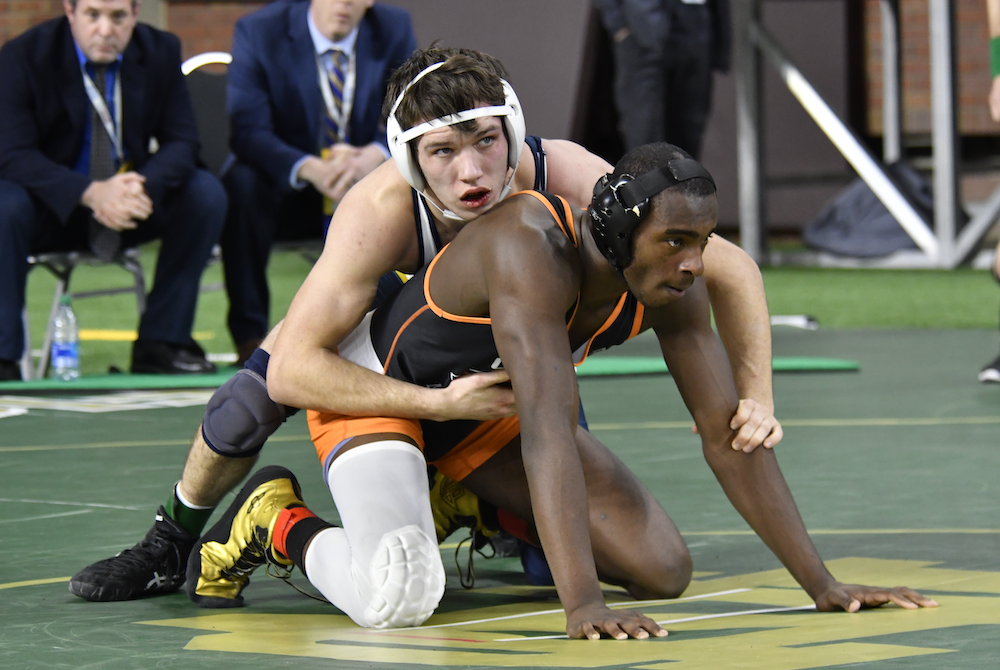
Willobee Makes Prediction Come True, Exceeds Seed to Become Champion
By
Drew Ellis
Special for MHSAA.com
March 2, 2024
DETROIT – With a mouthful of blood and a cowboy hat perched on his head, nothing could take away the joy of Gaylord sophomore Zane Willobee.
As the sixth seed in the 157-pound weight class of the Division 2 Individual Finals, not many would have anticipated him walking away with the championship Saturday at Ford Field.
But he did just that.
In a physical match, Willobee (29-3) took down Clio’s D’Marion Erlenbeck (28-6) by an 11-5 score to claim his first Finals championship.
“It was a stressful match, but I talked to my coaches before the match and they just stressed to keep my mind calm and give all glory to God,” Willobee said. “When I was out there, I was just trying to stay calm and capitalize on my opportunities. This is an amazing moment and one that I owe to a lot of people.
The Finals matchup at 157 wouldn’t have been one many saw coming as Erlenbeck was the fifth seed up against the sixth-seeded Willobee.
“Since Regionals I had been telling my coaches that it would be me and (Erlenbeck) in the Finals,” Willobee said. “I just knew that is how it would play out. You can’t focus on seeding this time of year. It’s about going out, performing, and having fun.”
The Finals matchup was a rubber match between the two, as each had narrowly defeated the other earlier this season. The difference Saturday was a pair of takedowns and near fall points for Willobee in the second and third periods.
After the match, the two competitors shared an embrace as they congratulated one another on their respective seasons.
“Erlenbeck is a wonderful competitor, and I give all my respect to him,” Willobee said of his opponent. “We’ve had some great matches, and he’s a wonderful competitor and an even better man.”
106
Champion: Jarrett Smith, Lowell, Soph. (39-1)
Major Decision, 15-4, over Cole Cichocki, Lowell, Fr. (26-12)
Smith found his first championship experience to be somewhat bittersweet. The sophomore had to face off with freshman teammate Cichocki for the crown.
Smith piled up six takedowns on his way to a 15-4 victory.
“I wish we could both win. It’s tough. One of us gets the title and one of us doesn’t, but we both worked really hard,” Smith said of wrestling his teammate in the final. “We both deserve it. We kind of thought we might meet up. We are both confident in our abilities, and our coaches have given us the tools to win.”
The two were hotel roommates this weekend and didn’t let the competition ruin their friendship.
“He’s one of my best friends,” Smith said of Cichocki. “He did better as a freshman than I did. You have to give him a lot of props. What he did is really impressive.”
113
Champion: Devan Garcia, Battle Creek Harper Creek, Fr. (47-1)
Major Decision, 12-4, over Cristian Haslem, St. Clair, Soph. (49-1)
Garcia was hoping to be on the offensive in Saturday’s 113-pound final.
Instead, it was his defensive ability that ended up earning him the title.
Garcia stuffed a pair of takedown attempts from Haslem and turned them into near falls as well. That gave him more than enough cushion to win the championship.
“I actually wanted to get in my attacks, but I pretty much scored on all his shots, so that’s the way it works out sometimes,” Garcia said. “I practiced those positions all the time, so I felt ready for them when they happened. To have it happen in the state championship feels great.”
The first stuff came in the first period to help Garcia start off with a 5-0 advantage. Haslem fought back to make it 5-3, but a second stuff from Garcia put him ahead 10-3 in the third.
120
Champion: Carter Cichocki, Lowell, Jr. (28-9)
Decision, 3-2, over Dominic Gumtow, Warren Woods Tower, Jr. (47-3)
After finishing runner-up at 113 pounds last year, Cichocki found himself two minutes from being a state champion.
Leading 3-2 to open the third, Cichocki knew if he could ride out his opponent for two minutes, the elusive title would be his.
Cichocki did just that, staying in control to overcome a 2-0 deficit and take home the championship.
“Things were different this year. Since my freshman year, I’ve tried to just see this as another match. I just stuck to what works for me and what I do best,” Cichocki said of handling the pressure of the third period. “It feels good to be a champion.”
126
Champion: Ricardo Saenz, Bloomfield Hills Brother Rice, Jr. (49-3)
Decision, 7-1, over Jaron Bensinger, Gaylord, Soph. (38-2)
Saenz wasn’t going to leave any doubt. The Bloomfield Hills Brother Rice junior shot out of a cannon to start the 126-pound final, scoring a takedown in the opening seconds of the bout.
From there, Saenz controlled Bensinger most of the way.
“I just kept telling myself that (Bensinger) wasn’t ready, and I was doing that to get myself motivated,” Saenz said. “I was thinking about starting the match like that all day and all season. I’ve been preparing for this moment, and I wasn’t going to let it get past me. It feels amazing to have it come to fruition.”
After taking a 2-1 lead through the first, Saenz rode out Bensinger in the second and then scored a reversal in the third with near fall points to cap off the title.
132
Champion: Jackson Blum, Lowell, Jr. (35-1)
Fall (4:54) over Trenden Bashore, DeWitt, Jr. (38-1)
Blum finds himself on the verge of being a four-time Finals champion, as the Lowell junior collected his third title with a third-round pin.
Blum recorded 11 takedowns in the match before securing a pin while ahead 23-9.
“I knew that my pace is really high, so I knew if I kept it on him, I would just keep getting to him more and more,” Blum said. “It was a tough first period, but I just trusted in my ability and stuck to the plan.”
Blum was the 112-pound champion as a freshman and the 120-pound champion as a sophomore.
138
Champion: Tee Ward, Freemont, Sr. (53-1)
Decision, 3-1, over Landon Thomas, St. Joseph, Jr. (48-1)
With the 138-pound championship bout tied 1-1 and a blood stoppage allowing Ward to get a break, he got into the music.
“We had a little bit of a break, and the song in the background just got me rolling,” Ward said.
Ward would come out of the stoppage and scored a takedown with 28 seconds remaining to go up 3-1. Ward then rode out Thomas to collect his first championship.
“I knew I had to get that takedown and ride things out from there. With five seconds left, I felt him sprawl out, and that was the best feeling of my life,” Ward added. “There’s so many emotions, but this is the best.”
144
Champion: Owen Segorski, Lowell, Jr. (34-6)
Decision, 5-1, over Jeffrey Miller, Jackson Northwest, Soph. (47-3)
Segorski had been on both ends of being in a state final. He was the 125-pound champion as a freshman, but then finished runner-up at 138 pounds as a sophomore.
This time around, the junior came back much more confident and it showed in a 5-1 win.
Segorski scored takedowns in each of the first two rounds and never let Miller get in any offense.
“It feels really good,” Segorski said of adding a second title. “I thought I should have won it last year, but I just didn’t perform and let the pressure get to me. It’s difficult to repeat, there’s a lot of pressure and it feels like you have to win. But, to be able to come back this year, I felt a lot more confident and I knew I was the better wrestler.”
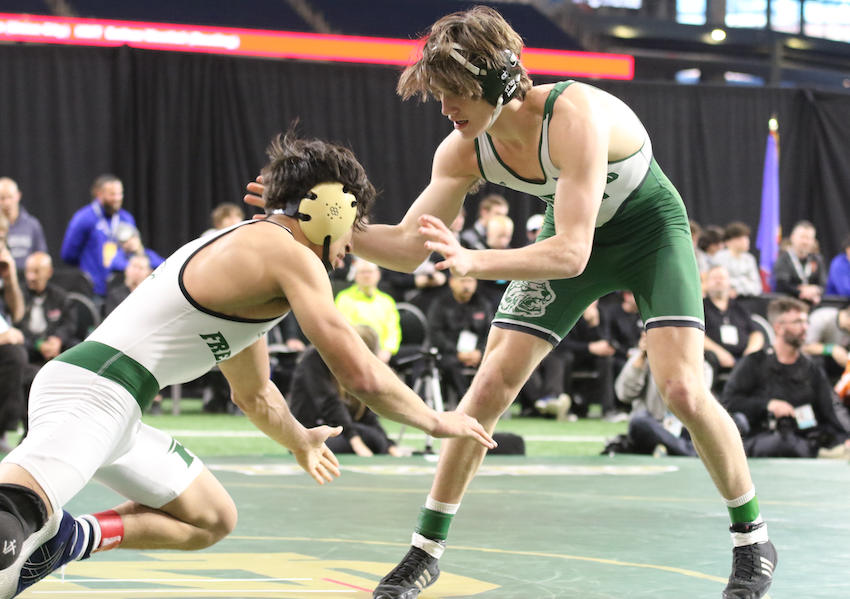
150
Champion: Lane Button, Wayland, Jr. (48-0)
Decision, 4-2, over Fabian Facundo, Freeland, Jr. (45-1)
A battle of two undefeated wrestlers came down to the final minute.
Button tried to push a hard pace in the 150-pound final, and it paid off with a takedown with 1:05 remaining in the third. The takedown was enough to push Button to the title.
“I was pacing (Facundo) out the whole time, and I knew I was going to get it,” Button said of the match-winning takedown. “As soon as things got neutral, I knew I was going to get it.”
“This means a lot to me. I put a lot into it,” Button said of going unbeaten. “I quit football just to focus on wrestling, and the work paid off.”
165
Champion: Nathan Dobson, Greenville, Sr. (41-4)
Decision, 5-4, over Harrison Meekhof, Allendale, Sr. (45-4)
Dobson knew the key to beating Meekhof based on previous matchups – he had to get more takedowns.
Dobson managed to do that in the 165-pound final, scoring takedowns in the second and third periods to hold off Meekhof and win the championship.
“I just knew I needed to get takedowns today. Every time it’s me and (Meekhof), it’s a takedown battle. I knew if I got the takedowns, I would get the victory,” Dobson said. “It’s the craziest thing I have ever felt. I can’t even dream this. It’s amazing.”
175
Champion: Kendall Drake, Holly, Sr. (50-2)
Decision, 7-4, over Derek Badgley, Mason, Sr. (40-3)
Drake had never placed at the Finals prior to Saturday; now he is a champion.
The senior overcame a 3-0 deficit to pick up a 7-4 win.
“Last year I got hurt in Districts, but all I have ever wanted was to win this tournament,” Drake said. “All summer I was practicing five days a week, going against the best guys I could find. I wanted to be confident in myself, so when this day came, I knew I could win this match.”
Drake nearly scored the opening takedown of the match but was ruled out of bounds. However, he didn’t let that get to him and worked his way to three takedowns in the victory.
“It didn’t matter, I was going to be ready to overcome any obstacles that came in my way,” Drake said of the slow start. “I wasn’t going to let anything dictate the match but myself.”
190
Champion: Ty Bensinger, Gaylord, Sr. (37-1)
DQ, over Easton Phipps, Goodrich, Sr. (27-1)
The 190-pound final in Division 2 didn’t end the way anyone wanted.
Phipps, the 2023 champion, led 1-0 in the second period when he picked up Bensinger to get him to the ground. However, Bensinger ended up landing on his head and the match was immediately stopped, as Bensinger went unconscious briefly according to his coach.
Medical staff on site checked on Bensinger and ruled he couldn’t continue. That led to Phipps being disqualified, giving the title to the Gaylord senior.
“These two have wrestled many times, and it’s always been a close match. (Phipps) certainly didn’t do it intentionally, it was just an unfortunate accident,” Gaylord coach Jerry LaJoie said.
215
Champion: Logan Demarest, Bay City John Glenn, Sr. (44-1)
Decision, 3-2, over Case Johnson, Greenville, Jr. (52-3)
Staying active and staying on the move is what allowed Demarest to come away with the 215-pound title Saturday.
After giving up a takedown to Johnson in the second period, Demarest fought his way to an escape to cut the lead to 2-1.
To open the third, Demarest did the same, earning an escape to even the match at 2-2. Then he kept the pressure on and forced a stalling point to be called in his favor, which proved to be the difference.
“I’ve got family and friends that have supported me all the way. They are the ones that got me here,” Demarest said of the title. “I was thinking about them and just kept doing whatever I could to keep pushing the pace.”
285
Champion: James Mahon, Goodrich, Jr. (44-3)
Decision, 9-8, over Parker Williams, Zeeland East, Sr. (46-3)
There were a lot of fireworks in the 285-pound final, as Mahon fought off Williams, 9-8.
Williams had a 5-0 advantage on the 2023 champion in the first period, but Mahon fought back to even things up at 5-5.
The match would be tied 7-7 in the third before Mahon dug deep and scored a takedown with 31 seconds remaining that proved to be the difference.
“I knew I could take him down. I knew I needed something, and I found it,” Mahon said of the late takedown. “It’s a really cool feeling (to repeat). There was a lot of pressure, and I’m almost glad it’s over.”
PHOTOS (top) Gaylord’s Zane Willobee, left, and Clio’s D’Marion Erlenbeck ready for the restart of their match at 157 pounds Saturday. (Middle) Wayland’s Lane Button, right, works against Freeland’s Fabian Facundo in the 150-pound title match. (Click for more from High School Sports Scene.)

